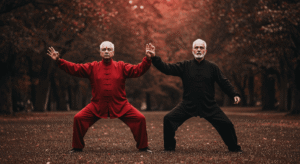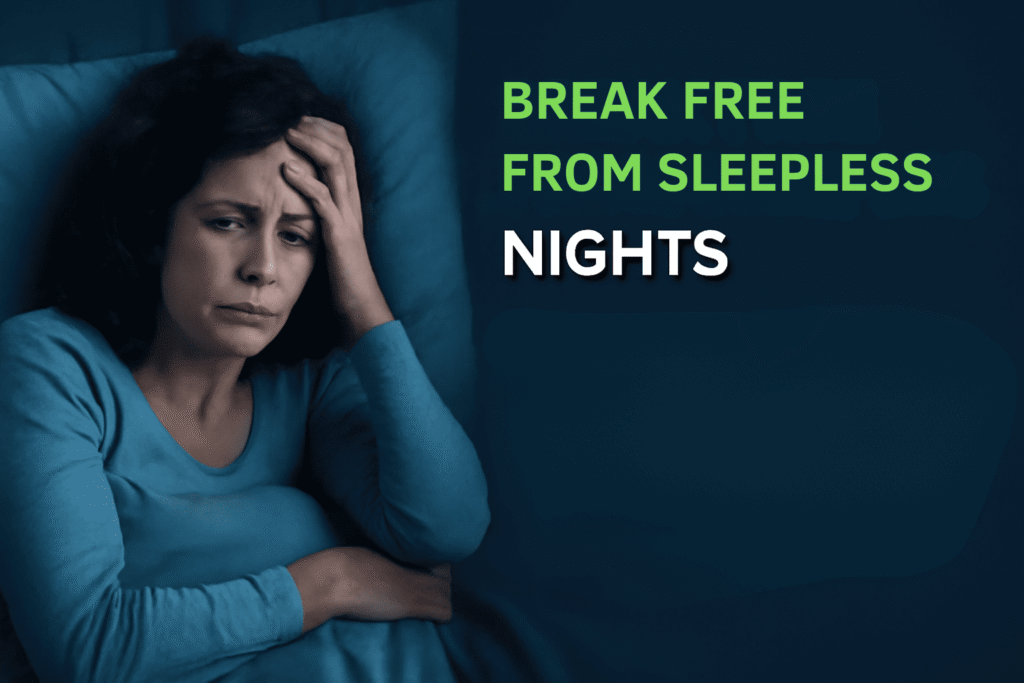Break free from sleepless nights with proven strategies to overcome insomnia naturally. Discover why you’re struggling and how small changes can transform your sleep quality.
What Is Insomnia and Why Are You Suffering?
Clinical insomnia affects approximately 10% of people, with another 20% experiencing occasional insomnia-like symptoms. Despite what sleep product marketers claim, not everyone who has trouble sleeping has clinical insomnia.
If you struggle with falling asleep, staying asleep, or waking too early, you may be experiencing insomnia. Daytime symptoms include persistent tiredness, irritability, poor concentration, and growing anxiety about bedtime.

Poor sleep doesn’t just leave you tired—it can damage your relationships, reduce work productivity, and is linked to increased risk of premature death. For older adults, increasing insomnia symptoms correlate with faster progression to greater disability.
The Insomnia-Depression Connection
Poor Sleep
Insufficient or disrupted sleep alters brain chemistry and hormonal balance, creating the perfect conditions for mood disorders to develop or worsen.
Brain Changes
Sleep deprivation affects the amygdala and prefrontal cortex, regions responsible for emotional regulation and logical thinking.
Depression Symptoms
As emotions become harder to regulate, depression symptoms emerge or intensify, including sadness, hopelessness, and lack of motivation.
More Sleep Problems
Depression further disrupts sleep patterns through rumination, anxiety, and changes in sleep architecture, creating a detrimental cycle.
Breaking this cycle often requires addressing both sleep issues and mood problems simultaneously. Improving your sleep can significantly enhance your mental well-being, while treating depression often leads to better sleep quality.
First Steps to Better Sleep: Review Your Medications
Many common medications can secretly sabotage your sleep quality. Certain prescription and over-the-counter drugs—or combinations of them—may cause insomnia as a side effect.

Common Sleep-Disrupting Medications
- Some antidepressants (especially SSRIs)
- Blood pressure medications
- Corticosteroids
- Allergy and cold medicines
- Weight loss products
What To Do
Schedule an appointment with your doctor specifically to discuss your sleep problems. Bring a complete list of all medications and supplements you take, including occasional use products.
Ask about possible medication adjustments, timing changes, or alternatives that might improve your sleep while still managing your health conditions.
The Alcohol-Insomnia Connection

How Alcohol Damages Sleep
- Reduces REM sleep, essential for memory and emotional processing
- Causes middle-of-night awakening as blood alcohol levels drop
- Worsens breathing problems during sleep, including snoring and sleep apnea
- Increases trips to the bathroom, further fragmenting sleep
- Leaves you feeling fatigued despite “sleeping” all night
Many people who reduce or eliminate alcohol consumption report dramatic improvements in sleep quality within just 1-2 weeks.
While alcohol might help you fall asleep initially, it severely disrupts your sleep quality later in the night. As your body metabolizes alcohol, it creates a rebound effect that fragments sleep and prevents the deep, restorative stages your body needs.
Movement Medicine: Exercise Your Way to Better Sleep
Yoga

Combines gentle movement with breath control to reduce cortisol levels. Even 20 minutes before bedtime can improve sleep onset. Particularly effective for reducing anxiety that prevents sleep.
Tai Chi

This ancient practice combines flowing movements with meditation, improving sleep duration by 18-48 minutes in clinical studies. Perfect for all ages and fitness levels.
Walking
Just 30 minutes of brisk walking daily can significantly improve sleep quality. Morning walks have the added benefit of resetting your circadian rhythm through natural light exposure.
Aim for at least 150 minutes of moderate physical activity weekly. Even short sessions provide benefits, but avoid intense exercise within 2 hours of bedtime as it may temporarily increase alertness.
Technology and Sleep: Breaking the Screen Cycle
How Screens Sabotage Sleep
- Blue light suppresses melatonin production, delaying your body’s natural sleep signals
- Engaging content keeps your mind stimulated when it should be winding down
- Notifications create stress and vigilance, preventing deep relaxation
- Social media can trigger comparison anxiety and rumination
Create a Device-Free Bedroom
The total time spent on screens before bed matters more than the specific activity. Create a technology curfew at least 1 hour before bedtime. Charge devices outside your bedroom to avoid temptation.
Replace screen time with relaxing alternatives like reading a physical book, gentle stretching, or writing in a gratitude journal. If you must use a device, enable night mode and reduce brightness to minimum levels.
Your 7-Day Sleep Transformation Plan
Consistent Schedule
Set fixed sleep and wake times, even on weekends. Your body craves regularity. This single change can dramatically improve sleep quality by regulating your internal clock.
Morning Sunlight
Spend 10-15 minutes outdoors within an hour of waking. Morning light exposure helps reset your circadian rhythm and improves nighttime melatonin production.
Environment Optimization
Keep your bedroom cool (15.6-21.1°C), completely dark, and quiet. Consider blackout curtains, white noise machines, or earplugs if needed. Remove all clocks from view.
Evening Routine
Create a 30-minute wind-down ritual before bed. Dim lights, avoid screens, and engage in calming activities like reading, gentle stretching, or deep breathing exercises.
Remember that overcoming insomnia takes time. If you’ve tried these strategies consistently for 4-6 weeks without improvement, consider seeking help from a sleep specialist who can provide Cognitive Behavioral Therapy for Insomnia (CBT-I), the gold standard treatment with better long-term results than medication.
How Alcohol Damages Sleep
- Reduces REM sleep, essential for memory and emotional processing
- Causes middle-of-night awakening as blood alcohol levels drop
- Worsens breathing problems during sleep, including snoring and sleep apnea
- Increases trips to the bathroom, further fragmenting sleep
- Leaves you feeling fatigued despite “sleeping” all night
Many people who reduce or eliminate alcohol consumption report dramatic improvements in sleep quality within just 1-2 weeks.
Movement Medicine: Exercise Your Way to Better Sleep
Yoga
Combines gentle movement with breath control to reduce cortisol levels. Even 20 minutes before bedtime can improve sleep onset. Particularly effective for reducing anxiety that prevents sleep.
Tai Chi
This ancient practice combines flowing movements with meditation, improving sleep duration by 18-48 minutes in clinical studies. Perfect for all ages and fitness levels.
Walking
Just 30 minutes of brisk walking daily can significantly improve sleep quality. Morning walks have the added benefit of resetting your circadian rhythm through natural light exposure.
Aim for at least 150 minutes of moderate physical activity weekly. Even short sessions provide benefits, but avoid intense exercise within 2 hours of bedtime as it may temporarily increase alertness.



